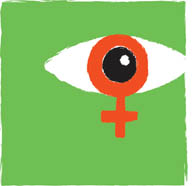POV
UN Human Rights Day
A daughter's belief and bravery

TZIGANE
Iran is a signatory to both the United Nations International Covenant on Civil and Political Rights and the International Covenant on Economic, Social and Cultural Rights, both based on the UN Declaration of Human Rights, which recognizes "the inherent dignity and the equal and inalienable rights of all members of the human family and in the equal rights of men and women." But Iran does not respect equality in its laws. There are many discriminating laws in Iran's civil and penal codes: A man can have four wives and divorce any one of them without any reason, but a woman cannot get a divorce if she is not satisfied with her husband; women's testimony in court has half the value of men's; and, as is well-known and well-documented, freedom of religion does not exist in Iran.
Nowadays — in my generation — more than 65 percent of university students in Iran are female. Many Iranian women have obtained high positions in society as members of parliament or university professors. On March 8, 2006, women held a peaceful legal demonstration but the police attacked them, beat many of them and arrested 70 people. There are many political prisoners in Iran. Some lawyers who defend them get arrested themselves for doing so. My mother, Shirin Ebadi, went to prison for defending the rights of the family of a university student who was killed by the militia in a protest to the shutting down of the Salam newspaper in Iran, so I know the pressure of working as a human rights activist in Iran. There are always threatening letters and phone calls. In the letters she received, my mother was accused of not being a good Muslim and speaking out against the government. Their only excuse for the atrocities is Islam and they don't like to hear somebody proving that Islam does not allow these atrocities. She was very assertive in her convictions; threats from the government never had any effect on her activities. When she was prevented from writing on women's issues, she started to write on children's issues as a way of writing and teaching human rights.
In the end, I have to confess that the threats from the government have made me fear for her safety. Sometimes I have been afraid of losing her and also of having something happen to our family or even to myself. She received many letters before her Nobel ceremony saying that she'd better wear a scarf when receiving her prize or risk losing me. (I never went alone anywhere for three months after this threat.) She never blamed me for being scared. She always says that fear is something natural but the important thing is not to let it control our lives or stop us from our ways, our paths and our aims. "Ask God to help you go through your way and know He is always by your side. Always do what you think you should do," she used to tell us. She strongly believes in staying in our country.
As a daughter of a human rights activist, I learned many things. Learned that in order to be a human rights activist in a dictatorship, you need not only the knowledge but also the bravery. First the bravery to stay. Stay despite war, despite hardship and despite all the stones that might be thrown both at you and before you.
Nargess Tavassolian is a first-year L.L.M., non-thesis student at McGill and the daughter of human rights lawyer, activist and Nobel laureate Shirin Ebadi.

